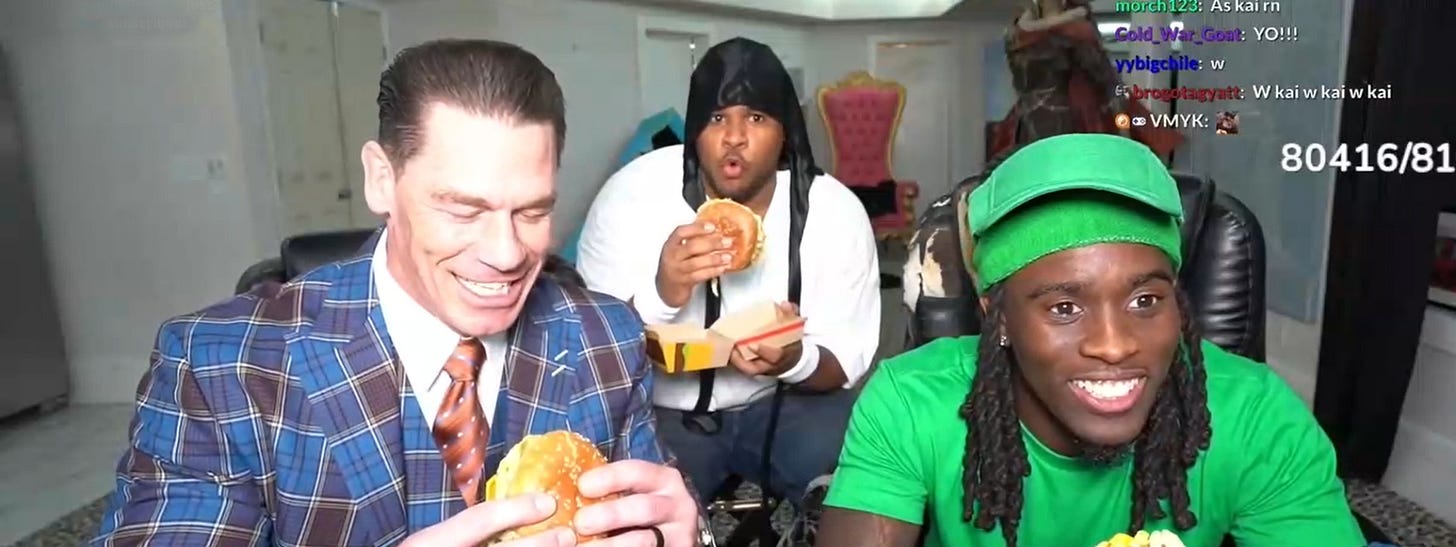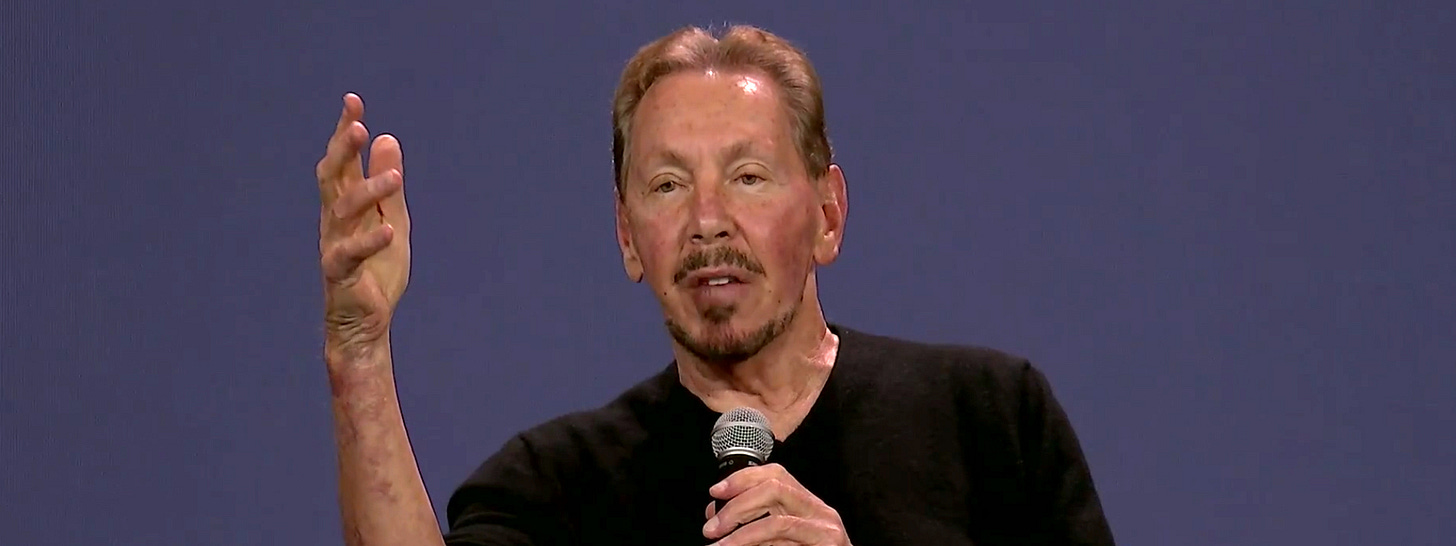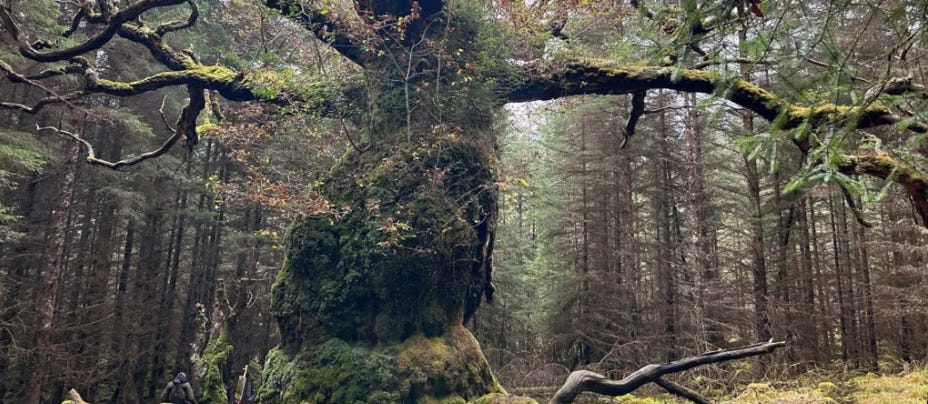Kid’s snack moves upscale, burger plays chicken, and Ellison goes dystopian
The glut might kill us
This issue’s EARcandy section features a recent New York Times piece called How Everyone Got Lost in Netflix’s Endless Library, read aloud as an episode of the newspaper’s The Daily podcast. In the article, journalist Willy Staley explores the financial structure and cultural significance of Netflix. Everyone reading this knows Netflix and probably uses it every week. But the Netflix you use and the one I use might be completely different.
The streamer’s 18,000-title repository grows larger each year. Although its algorithm is supposed to present viewers with finely curated choices, the average American spends 45 hours per year trying to decide what to watch on the platform. And that stat is from 2019. The figure is bound to be higher today.

This overwhelming quantity of options and the ensuing selection paralysis is what I call the glut effect. Too much stuff makes a system inefficient, which is bad enough. But now the stuff is making more stuff.
I’ve already written about AI slop in this newsletter. The internet is fast becoming overwhelmed with “artificial content”, whether it be images, words, or a combination of both in the form of a website. The cost of digital reproduction has essentially been zero for decades, but AI has taken that cost below zero. For sure, there’s an environmental cost to the training of Large Language Models (LLMs) and the output of servers when a prompt is processed, but while the financial cost of copying a file used to be essentially zero (for someone privileged enough to own a computer and software) AI now also reduces the labor cost to zero.
The latest shiny new AI toy comes from Microsoft: the AI agent, which will mindlessly take control of your computer and do all kinds of things on your behalf, such as running programs, contacting other computers, making a schedule for you, purchasing real-world items, and designing personalized porn. Okay, that last one is a joke… except that it probably exists. Google is planning to release its own agent next month and other giant corporations cannot be far behind. These agents are flawed in their current versions but, as this article points out, so are people, and the agents don’t complain or take sick days.
You might have already experienced the automated reproduction and distribution of AI-created content in the form of weird ads and weird images. Gaming a system where the entry cost is almost zero is too tempting for unethical actors everywhere. Maybe these actors are Russian propagandists who spew out fake news. Maybe they’re Chinese retailers who sell fake products. Maybe they’re American musicians who upload fake songs. Whatever it is, there’s a glut of digital content that is clogging up the internet, moving at what seems to be an accelerated pace.
This glut is a consequence of unfettered capitalism. And there’s a deep irony here. From a capitalist’s perspective, one of the negative aspects of communism is that there’s never enough stuff to go around. Food shortages, failed supply chains, power grid blackouts have been the bane of communist regimes historically, and still are today in countries like Cuba. Abundance was supposed to be a feature, not a bug. But the neoliberal playbook has intersected with Silicon Valley tech wizardry in a perfect slopstorm that has even extended beyond the digital realm.
The NYT article also delves into Uber, the “industry disruption” poster child. When the rideshare company was launched, taking on massive debt funded an unstoppable rollout that captured the market from other transportation services, in particular taxis, which quickly became the comparatively expensive and inconvenient option. Continually underpaying desperate drivers meant that Uber could charge lower fees to riders, thereby completing the vicious circle. Taxi drivers were forced out of business and then Uber was able to raise prices because consumers were committed.
But guess what? It’s worse than being subject to surge pricing when the bars close. There’s a glut of single-use vehicles in some cities, with more than 100,000 rideshare vehicles in New York City alone. Navigating Manhattan traffic is more frustrating than ever. And ambulance response times are getting slower by the month. There’s genuine danger here.
Back to Netflix. Have you cut your TV cable subscription, only to be stuck using a slew of paid streaming services that are now raising their prices and playing ads? That’s the glut.
How about the feeling that you’re overwhelmed by content, news, and all the stuff you have to do in your life? That’s also the glut working its neoliberal magic on you.
If the internet dies because AI slop makes it unusable, if an ambulance can’t save a life because of too many rideshare vehicles, what should we call this glut? My diagnosis is clogged arteries. We might be on the verge of cardiac arrest. And I have no idea what the cure is.
Can a kids’ snack be rebranded for adults?
In an alternate universe, your peanut bowl at the bar is filled with Goldfish crackers instead. The “snack that smiles back” was originally meant to be a bar snack, back in the 60s. After successfully rebranding as a children’s snack in the 90s, it’s trying once again to hook older audiences. In an attempt to make a splash in a bigger pond… in fact, in an entire ocean, Goldfish renamed itself Chilean Sea Bass for the final week of October, with limited-time bags available at chileanseabasscrackers.com. Even though the formula stayed exactly the same, the package explains that the new moniker gives them an “adult-sounding name, same Goldfish taste.”
The new name was chosen because Chilean sea bass are considered an upscale delicacy, and not because they resemble goldfish in any way – they are sharp-toothed terrors with an uncomfortable branding story of their own. Originally called Patagonian toothfish, a wholesaler in the 70s renamed them to be more attractive to the American market, just like these other rebranded foods. His plan went so swimmingly that they are now an endangered species. Their limited-time snack brethren also got snapped up, with all Chilean Sea Bass selling out by the last day of sales.
Is the pen mightier than the AI sword?
Over 30,000 creative professionals and artistic organizations have signed an open letter against the unlicensed use of creative work to train AI. The letter was posted in mid-October and gained traction rapidly, with celebrity signers including members of Radiohead and Abba, actors including Julianne Moore and Kevin Bacon, as well as authors such as Emma Donoghue and Kazuo Ishiguro. This statement is timely, considering the thirty copyright lawsuits against AI in the United States alone, spearheaded by high-profile artists and organizations such as the New York Times, George RR Martin, and Sony Music.

The letter also follows another one signed by hundreds of artists earlier this year, calling on the US Congress to pass the No AI FRAUD Act to prohibit AI-generated fakes. A former AI executive and composer organized the current letter, believing that “right now, it’s important to send a message.” The letter’s one-sentence statement does not beat around the bush: “The unlicensed use of creative works for training generative AI is a major, unjust threat to the livelihoods of the people behind those works, and must not be permitted.” Will our tech overlords listen or will they simply steal from Abba by saying, “Thank you for the music”?
What’s not not a Big Mac?
McDonald’s is aiming to rule the hype roost with the limited-time US launch of a poultry-fied classic. Marketing efforts are targeted at Gen Z, using two things they go cock-a-doodle for: Twitch and dupes. In October, popular Twitch streamer Kai Cenat joined forces with celeb John Cena in an hour-long munchfest to eat Chicken Big Macs and contemplate the most pressing philosophical question of our time: “Is the Chicken Big Mac not not a Big Mac?”
As a proud vegetarian, I generally avoid praising meat marketing, but this campaign is a great example of product/market/media synergy. To target Gen Z’s love of dupes, McDonald’s set up an undercover one-day-only fake restaurant in Los Angeles called McDonnell’s to sell the Chicken Big Mac as a “Chicken Sandwich”. Other marketing efforts included a retro mini-game on Zynga, turning the Sphere in Las Vegas into a massive Big Mac/Chicken Big Mac animation, an appearance at Billboard Latin Music Week, where music group Eslabon Armado also discussed whether the Chicken Big Mac is not not a Big Mac, and nine commercials (so far). Will the Chicken Big Mac not not surpass the Big Mac in our cultural imagination? Maybe not not?
Winston Churchill, former British Prime Minister
As America goes to the polls, as election interference rears its head, as gerrymandering and an outdated electoral college system distort the results, it’s worth remembering these famous words:
“Many forms of Government have been tried, and will be tried in this world of sin and woe. No one pretends that democracy is perfect or all-wise. Indeed it has been said that democracy is the worst form of Government except for all those other forms that have been tried from time to time…”
Larry Ellison’s dystopian vision
According to Forbes, the third-richest person in the world is Larry Ellison the co-founder and executive chairman of software company Oracle. Ellison has also been involved in various ways with US Republican politicians, as well as having close ties to Israeli Prime Minister Benjamin Netanyahu. Why does all this matter? Because at a recent Oracle financial analysts event he outlined his vision for surveillance using AI, including real-world scenarios involving policing, health, and schools.
Instead of summarizing or interpreting what he said, I’ll simply let his quotes speak for themselves. You can watch the Q&A video here (the quotes start at 1hr, 7 mins, 55 secs).
“We can use AI to read your [health] insurance policy… we can look at the patient and the condition of the patient and tell you right away whether that should be covered.”
“Securing schools. We think that we can absolutely lock down schools. Dramatically reduce the case of anyone being on campus that doesn’t belong on campus and the second someone pulls out a gun immediately alert… use AI cameras to immediately recognize that.”
“Police… we’ve completely redesigned body cameras… the camera is always on… you don’t turn it on and off… “Oracle, I need two minutes to take a bathroom break.” Then we’ll turn it off. The truth is, we don’t really turn it off. What we do is, we record it so no one can see it… But AI is constantly monitoring the video… the police will be on their best behavior.”
The truly dystopian aspect of all this is that decades of neoliberal policies have created conditions where healthcare, policing, and gun control need “solutions” which are being helpfully provided at enormous expense by tech firms like Oracle.
Is it too late to go back to DVDs?
Many readers already know that Netflix began life as a mail-order DVD company that helped put Blockbuster out of business.

The Daily’s podcast version of a New York Times article called How Everyone Got Lost in Netflix’s Endless Library (the one I refer to in this newsletter’s introduction) is a fascinating listen because it explores the unsavoury financial underpinnings of a market takeover by issuing debt, with examples ranging from Uber to WeWork and, yes, Netflix. As J. Paul Getty is quoted as saying, “If you owe the bank $100, that's your problem. If you owe the bank $100 million, that's the bank's problem.”
Tree of the year
Not all countries have a Tree of the Year, but Britain does, and this year’s winner is a gnarly oak that has been growing in the Scottish Highlands for anywhere between 400 and 1,000 years (which is the same degree of specificity that I apply to my own age).
As this BBC article states, “Native woodland experts had no idea the tree existed until a gathering in 2009. The band Skipinnish, which had played at the event, knew of the tree and led the conservationists to where it was hidden in a non-native Sitka spruce plantation on Achnacarry Estate.”
The Skipinnish Oak won a nationwide public vote against 11 other contenders who were left pining for what might have been.
Do you think we should vote on our best tree in Canada and the US? Let me know!
Did you enjoy this issue of Discomfort Zone? You can comment directly in the Substack app or drop me a line by emailing me at john@johnbdutton.com.
And why not connect with me on LinkedIn if you haven’t already?
FOMO food research and writing by Silvia Todea, editing by John Dutton.
Legal disclaimers:
All images in this newsletter that are not the property of the author are used with permission or reproduced under the fair use provisions of the Canadian Copyright Act while giving appropriate credit.
The content published in this newsletter represents the views and opinions of John B. Dutton in his capacity as a private citizen and are not in any way connected to his role with the National Film Board of Canada.
















